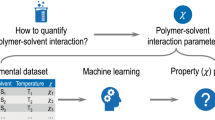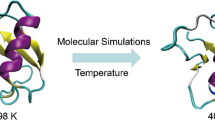Abstract.
Although melting of flexible macromolecules in an irreversible process, it was demonstrated recently with temperature-modulated calorimetry (TMC) that some of the overall melting may be reversible within a fraction of a kelvin. This was taken as evidence for incompletely melted molecules with a remaining molecular nucleus. The reversing heat capacity that characterizes this effect was observed to decrease with time. It is shown by new TMC experiments that this time effect is not induced by the temperature modulation, but is due to an inherent annealing process. It is also proven that it is not dependent on the type of calorimeter.
Similar content being viewed by others
Author information
Authors and Affiliations
Additional information
Received: 7 November 1997/Revised version: 19 December 1997/Accepted: 19 December 1997
Rights and permissions
About this article
Cite this article
Schick, C., Merzlyakov, M. & Wunderlich, B. Analysis of the reorganization of poly(ethylen terephthalate) in the melting range by temperature-modulated calorimetry. Polymer Bulletin 40, 297–303 (1998). https://doi.org/10.1007/s002890050255
Issue Date:
DOI: https://doi.org/10.1007/s002890050255




